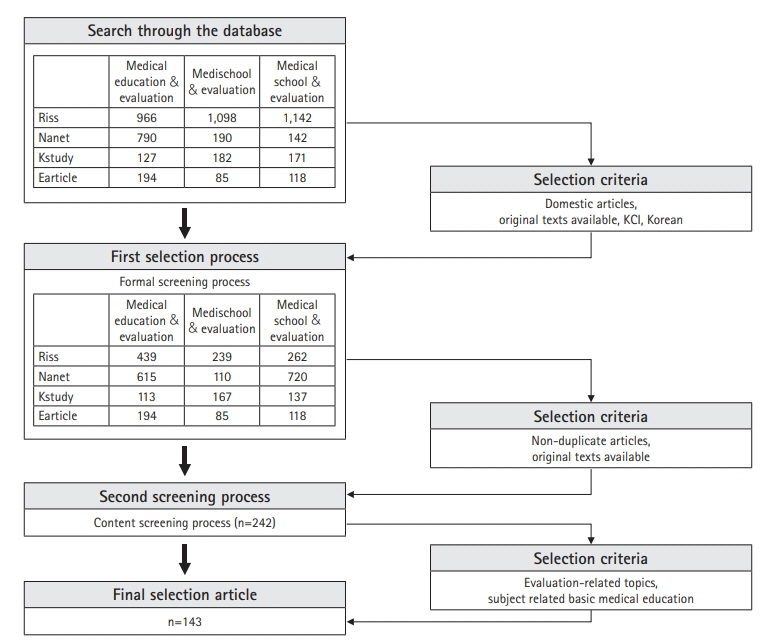J Yeungnam Med Sci.
2023 Jul;40(3):233-240. 10.12701/jyms.2022.00563.
Evaluation research in Korean medical education: a systematic review
- Affiliations
-
- 1Department of Medical Education, Eulji University School of Medicine, Daejeon, Korea
- 2Department of Medical Humanities, Yeungnam University College of Medicine, Daegu, Korea
- KMID: 2544582
- DOI: http://doi.org/10.12701/jyms.2022.00563
Abstract
- The purpose of this study aims to analyze research trends related to ‘evaluation’ in Korean medical education through a systematic review. This study used a systematic review method, which is a research methodology for research trends and ‘literature analysis.’ Researchers searched the Korean journal literature published until the end of December 2020 in the Korean research database with keywords related to medicine and evaluation. Thus, 5,205 cases were identified. Based on these data, 143 papers were selected through a logical screening process, requiring 1 month to complete the data search and analysis process. In terms of publications, medical journals overwhelmingly outnumbered nonmedical journals until 2015; however, after 2016, the number of papers published in nonmedical journals increased, and the number of published papers was similar to that of medical journals. In terms of evaluation-related research, research on student and program evaluations has been very active compared to that on accreditation. As the number of evaluation studies has gradually decreased over the past 10 years, preparing a plan to revitalize them in Korean medical education is necessary. Considering that the role of evaluation in education has been emphasized in recent years, research on reestablishing the concept of evaluation; developing evaluation indicators; analyzing the status of student evaluation, program evaluation, and accreditation; and deriving measures to improve medical education through evaluation is required.
Figure
Cited by 1 articles
-
Patient-physician interaction education in Korea: a systematic review
Hwan Ho Lee, Yu Ra Kim, Hye Jin Park
J Yeungnam Med Sci. 2024;41(2):74-79. doi: 10.12701/jyms.2023.01109.
Reference
-
References
1. Kwon SD. Misuse and abuse of educational evaluations. J Edu Eval. 2013; 26:739–54.2. Lee WS. Values in program evaluation. J Edu Eval. 2016; 29:529–42.3. Hong HJ, Yoon SP. The relationship between academic achievements and curricular changes on anatomy based on basic medical education examination. Korean J Phys Anthropol. 2016; 29:105–12.4. Lee GJ. Theoretical consideration of objectivism and subjectivism in educational evaluation research. Educational evaluation study. J Edu Eval. 1993; 6:155–69.5. Park HJ, Kim YR. A study on outcome based education in korean medical education. J Humanit Soc Sci 21. 2020; 11:1563–74.6. Cook DJ, Mulrow CD, Haynes RB. Systematic reviews: synthesis of best evidence for clinical decisions. Ann Intern Med. 1997; 126:376–80.7. Kim SY, Park JE, Seo HJ, Seo HS, Son HJ, Sin CM, et al. NECA’s guidance for undertaking systematic reviews and meta-analyses for intervention. Seoul: National Evidence-based Healthcare Collaborating Agency;2011. p. 271.
- Full Text Links
- Actions
-
Cited
- CITED
-
- Close
- Share
- Similar articles
-
- Patient-physician interaction education in Korea: a systematic review
- A Proposal for the Future of Medical Education Accreditation
- Systematic Review and Meta-Analysis of Studies Evaluating Diagnostic Test Accuracy: A Practical Review for Clinical Researchers-Part I. General Guidance and Tips
- Educational Program Evaluation System in a Medical School
- A proposal for the future of medical education accreditation in Korea


